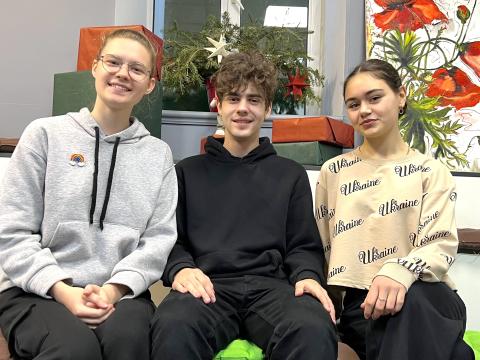Displaced Ukrainian children face a new way of life after fleeing from war and adapting to a new environment

Dmytro, Leviza, and Viktoria are three teenagers who found themselves in the heart of Bila Tserkva, the second largest city in Kyiv Oblast, after fleeing from their cities located close to the frontline of the ongoing war.
After the tough adjustment, they gradually gained knowledge and friendships as they adapt to their new lives. Ukraine’s displaced children are embarking on a journey of a lifetime, fleeing from their towns and cities, changing their places of residence, and facing new challenges.
Among them the displaced adolescents faced with the difficulty of access to quality education due to lack of required documents, financial constraints, or insufficient educational facilities to accommodate them.

Most may feel isolated and lonely. A new city and a new home can lead to stress and emotional distress, especially when children lose family ties and familiarity. Their families also struggle economically, with parents losing jobs and adapting to new in living conditions.
Victoria, 15, began a new stage in her life when she and her family evacuated from the city of Bakhmut, Donetsk Oblast in the spring of 2022. However, this move was not easy. It did not only lead to a change in her geography but also made significant changes to her daily routine and language.
Now in high school, Victoria or Vika as she is fondly called, decided to continue her studies remotely from her home school in Bakhmut, communicating with her classmates and teachers online. Adapting to a new place of residence in Bila Tserkva was a challenge.

She has no friends in the city at first. This prompted her to join a children’s camp organized by The Organization. The project run by NGO Girls since the escalation of the war was initially supported by World Vision through funding from Aktion Deutschland Hilft (ADH).
Here she not only made new friends but also had the opportunity to deepen her knowledge of English by studying it with a native speaker and in a speaking club with her peers. Participation in workshops on Ukrainian history and Mathematics give children the opportunity to learn and interact with their peers.
"I spoke a different language when I was in Bakhmut and only used Ukrainian when I was in school. With my participation in the camp, I started speaking in Ukrainian everyday”, says Victoria.
Long-term support is critical because these are mostly displaced children who need to be integrated into the communities where they find themselves in, to help them cope with the reality of the war.
Dmytro, 16 years old, came from the city of Melitopol, in Zaporizhzhia region. He is in the last grade and moved to Bila Tserkva with his family. After school, he dreams of going to university to study computer science. Even with distance learning, he decided to stay in his home school and did not go to a full-time school in Bila Tserkva.
Integration in the new city was not so easy. "At the beginning, I had no friends and acquaintances, I was always at home," Dmytro recalls. However, after attending a camp organized through the project, Dmytro found himself involved in active activities such as sports games and quests in the park. Here he not only made friends but also developed in different directions.

15-year-old Leviza, comes from a large family from the city of Henichesk, Kherson region. She dreams of becoming a lawyer. She also studies remotely at her home school in Henichesk. At first, she stayed at home, but over time, when she started taking her younger sister to school and visiting the center, she became interested and decided to attend the camp.
She was fascinated by the project's activities such as playing volleyball, drawing workshops, and history quests. This allowed her not only to find entertainment but also to develop her talents and interests.
Oksana, the project curator in Bila Tserkva, said: "Even after the end of the funding, their center continues to work towards supporting new residents of Bila Tserkva on a volunteer basis."
"New families with children who need psychosocial support and educational assistance are constantly arriving. The project gives the displaced children a much-needed sense of normalcy and hope", Oksana continues.

This demonstrates the importance of continuing to work in the field of social support and integration for those looking for a new home in Bila Tserkva.
The stories of Dmytro, Leviza, and Victoria reflect the real difficulties and joys of adaptation in a new city, where the harmony of knowledge, friendship, and support play an important role in shaping their future.
“Long-term support is critical because these are mostly displaced children who need to be integrated into the communities where they find themselves in, to help them cope with the reality of the war,” Daria Chekalova, Deputy Director, NGO Girls.

By Vira Sholinian, Advocacy Advisor